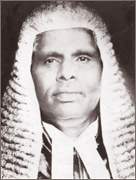C. Nagalingam
C. Nagalingam | |
|---|---|
 | |
| Acting Governor-General of Ceylon | |
| In office 1954–1954 | |
| Monarch | Elizabeth II |
| Prime Minister | John Kotelawala |
| Preceded by | Lord Soulbury |
| Succeeded by | Lord Soulbury |
| Acting Chief Justice of Ceylon | |
| In office 1954–1954 | |
| Preceded by | Alan Rose |
| Succeeded by | Hema Henry Basnayake |
| Puisne Justice of the Supreme Court of Ceylon | |
| In office 1947–1958 | |
| 27th Attorney General of Ceylon | |
| In office 25 January 1946 – 1947 | |
| Preceded by | Manikku Wadumestri Hendrick de Silva |
| Succeeded by | Edward Percival Rose |
| Personal details | |
| Born | 25 October 1893 |
| Died | 25 October 1958 (aged 65) |
| Nationality | Ceylonese |
| Spouse | Gnanam |
| Relations | C. Amirthalingam C. Panchalingam C. Suntharalingam C. Thiagalingam |
| Alma mater | Ceylon Law College Royal College, Colombo St. John's College, Jaffna |
| Profession | Judge, lawyer |
| Ethnicity | Ceylon Tamil |
Chellappah Nagalingam, KC (25 October 1893 – 25 October 1958) was a leading Ceylonese judge and lawyer. He was a Judge of the Supreme Court of Ceylon and served as acting Governor-General of Ceylon in 1954.[1][2] He also served as acting Chief Justice, acting Legal Secretary and Attorney General. He was the first Ceylon Tamil to be appointed to the bench of the Supreme Court of Ceylon.[2][3] He is considered to be the leading founder of Hindu College Colombo.
Early life and education
[edit]Nagalingam was born on 25 October 1893.[2][4] He was the son of Chellappah and Meenachchi from Urumpirai in Northern Province of Ceylon. He hailed from a distinguished family and had four eminent brothers: C. Suntharalingam, a member of parliament and government minister; C. Panchalingam, a medical doctor; C. Amirthalingam, Director of Fisheries; and C. Thiagalingam, a leading lawyer. Nagalingam was educated at St. John's College, Jaffna and Royal College, Colombo where he excelled in studies and sports and won the De Soysa Science Prize.[2][4] Thereafter he entered Ceylon Law College, qualifying as an advocate in 1917.[2]
Legal career
[edit]After Nagalingam was called to the bar, he practised law in Colombo until 1937.[2] In 1938 he was appointed an Additional District Judge of Colombo.[2][4] He was appointed District Judge of Kandy in 1941 and acting Attorney General in 1946.[2][4] He was also appointed King's Counsel in 1946.[2] In 1947 he became acting Legal Secretary, one of the three official members of the State Council, heading committee of justice with ministerial rank in the Board of Ministers.[2][4] He was also called to the bench as an acting puisne justice and was confirmed justice of the Supreme Court in 1947, the first Tamil to hold that post.[2][4] He was later appointed Senior Supreme Court Judge and acted as Chief Justice on a number of occasions.[2][4] In this capacity he was called upon to briefly serve as acting Governor-General in 1954 whilst Lord Soulbury was out of the country.[2][4]
Nagalingam was chairman of the Civil Courts Commission and the Salaries Commission, and member of the Council of Legal Education and the Judicial Service Commission.[2]
Nagalingam was one of the founders of the Hindu Educational Society, which founded Hindu College Colombo in 1951.[5]
Family
[edit]Nagalingam married Gnanam, daughter of Vaithilingam. They had two sons (Yogalingam and Bakthilingam) and four daughters (Maheswari, Sarveswari, Vigneswari and Nandeswari).[4] Nagalingam died on 25 October 1958.[4]
References
[edit]- ^ Abeyesekera, Kirthie (11 February 2001). "Casteism in the north". The Island, Sri Lanka.
- ^ a b c d e f g h i j k l m n Maniccavasagar, Chelvathamby (25 October 2011). "Justice Nagalingam – first Tamil Supreme Court judge". Daily News. Archived from the original on 28 December 2011. Retrieved 3 December 2011.
- ^ Amerasinghe, A. Ranjit B. (1986), The Supreme Court of Sri Lanka : the first 185 years, Sarvodaya Book Pub. Services, ISBN 978-955-599-000-4
- ^ a b c d e f g h i j Arumugam, S. (1997). Dictionary of Biography of the Tamils of Ceylon. p. 111.
- ^ "History of College". Colombo Hindu College. Archived from the original on 15 October 2011. Retrieved 3 December 2011.


 French
French Deutsch
Deutsch

